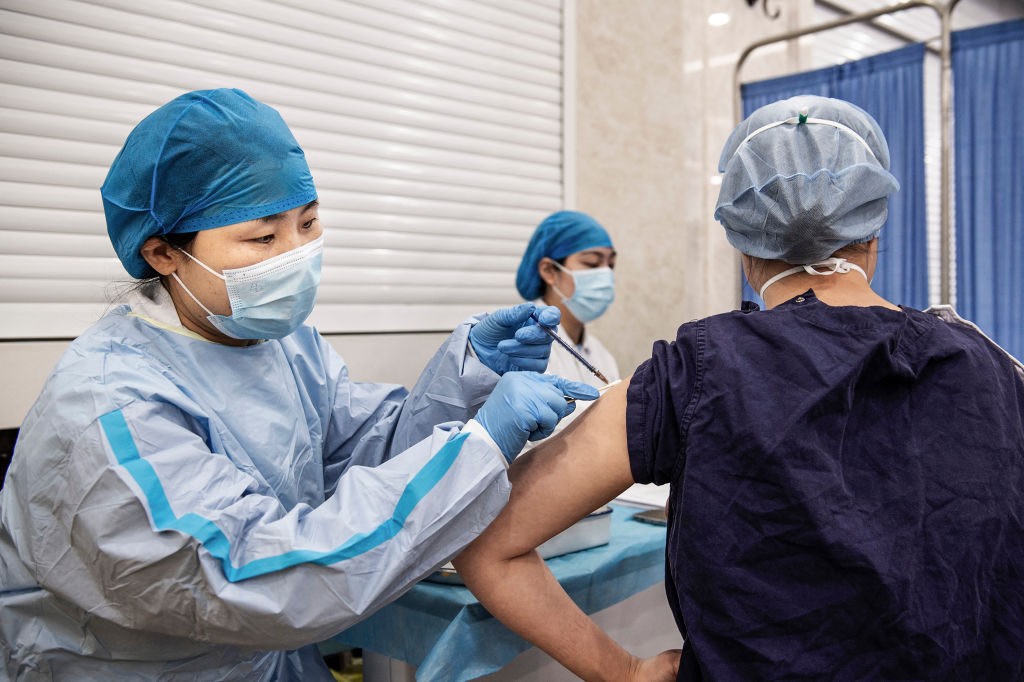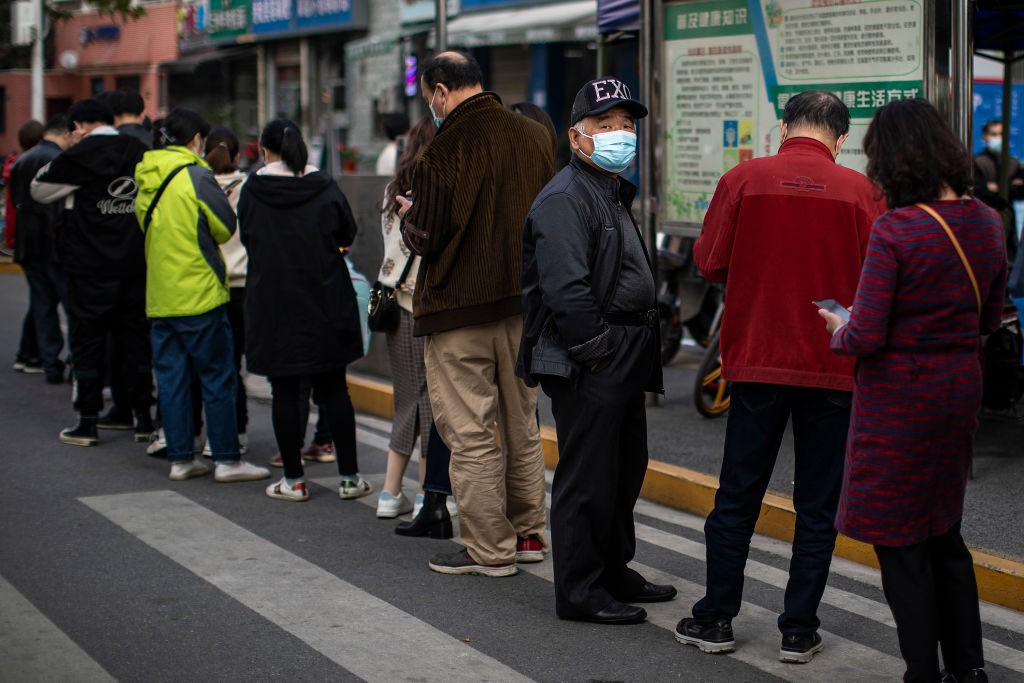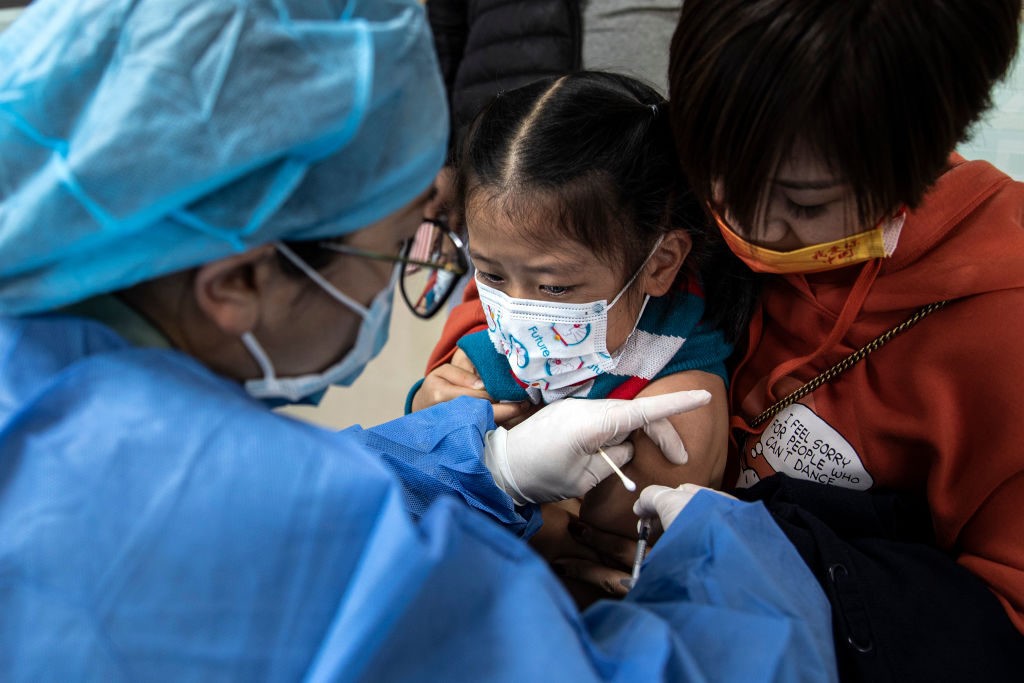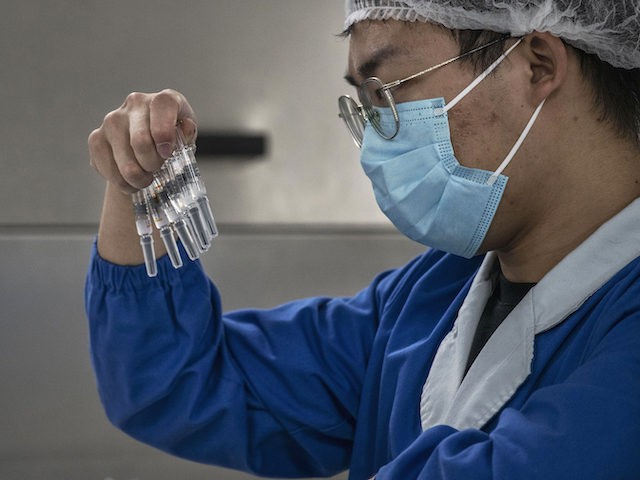The Chinese government newspaper Global Times claimed in a report Tuesday that an experimental vaccine product by the small Chinese company CanSinoBIO “can provide a decent level of protection” against the Omicron variant of Chinese coronavirus.
The World Health Organization (W.H.O.) designated Omicron, first identified in South Africa but believed to have been circulating in Europe before the first African cases, a “variant of concern” in late November after it began rapidly spreading in the region, due in part to significant deviations from the currently dominant variant of the virus, the Indian “Delta” variant, that may make it more contagious and resistant to vaccines. South African doctors have told the media that, while Omicron appears far more infectious than Delta, anecdotally the patients they have treated with Omicron appear to be exhibiting milder symptoms than those infected with previous variants.
A study from the University of Hong Kong available in anticipation of publication this week found that the domestic vaccine product the Chinese government most aggressively promoted around the world, from the much larger firm Sinovac Biotech, provides absolutely no protection against the Omicron variant. The vaccine product developed by Chinese company Fosun Pharmaceuticals in conjunction with American company Pfizer fared only slightly better than the Sinovac product, officially known as “Coronavac.”
As CanSino is a much smaller company, Beijing has promoted its product far less aggressively than the Sinovac product despite it initially testing at a higher efficacy rate than “Coronavac.” On Tuesday, however, the Global Times suggested that, having spread billions of doses of Sinovac’s product around the world, the CanSino vaccine may be the future.

A medical staff member (R) receives a booster shot of the Sinopharm Covid-19 coronavirus vaccine at a hospital in Wuhan in China’s central Hubei province on November 25, 2021. (STR/AFP via Getty Images)
“CanSinoBIO told the Global Times on Tuesday that after one dose … the pseudovirus neutralizing antibodies against Omicron will only have a slight decrease compared with the original strain of the coronavirus,” the propaganda outlet claimed, “which means that the vaccine’s effectiveness in face of Omicron is just slightly lower than of the original type of the coronavirus.”
The Global Times, citing the company, claimed a ten-fold increase in the number of antibodies a patient produces compared to inactivated virus vaccines, like “Coronavac.” The CanSino product is a “recombinant” vaccine, meaning it uses a second deactivated virus, an adenovirus, to carry the information necessary to produce antibodies against the Chinese coronavirus in a human body.
CanSinoBIO claimed that, despite the relative alleged success of its current product, it is currently developing an Omicron-specific vaccine.
CanSino’s first vaccine initially tested at 65.7-percent efficacy against earlier Chinese coronavirus strains, significantly better than Sinovac’s 50.38-percent efficacy. Vaccines typically need to reach a 50-percent efficacy threshold to be considered effective.

Residents wear masks while lining up to receive COVID-19 vaccines at a vaccination site on November 18, 2021 in Wuhan, China. (Photo by Getty Images)
After “Coronavac” tested far below American products from Pfizer and the U.S. firm Moderna, which claimed efficacy above 90 percent, the CEO of Sinovac later claimed “Coronavac” was between 80-90 percent effective in Chinese state media interviews, but never explained where that number came from.
CanSino struggled to compete with Sinovac for several reasons. Pierre Morgon, senior vice president for international business at the company, told Fortune magazine in March that the company had published data on the vaccine at a much slower pace that its larger competitor because “we have less staff, less medical affairs, and less regulatory experience, etc., than others” and because it was using more complex technology that did not have the decades of verification that traditional inactivated virus technology has. At the time, CanSino had not published Phase III trial data in a peer-reviewed journal but had already began circulating internationally.
Morgon emphasized that the CanSino product was developed in conjunction with the People’s Liberation Army (PLA), the Chinese military, and that while small, CanSino had a history of cooperating with the military.
Very few countries consider an individual who has received doses of CanSino products fully vaccinated. At press time, ten nations – including Chinese allies Hungary, Chile, Argentina, and Malaysia – accept CanSino as a verified coronavirus vaccine product for travelers from abroad. Mexico, Pakistan, and Hungary have distributed vaccine doses. In November, CanSino applied for approval in Brazil.

A child receives a vaccine against COVID-19 at a vaccination site on November 18, 2021 in Wuhan, China. Local adults who completed the second dose of vaccine began to receive the third dose and more than 600 thousand children aged 3 to 11 in Wuhan had completed the first dose. (Photo by Getty Images)
The CanSino news, if true, may buoy the Chinese vaccine industry as its struggles with the poor efficacy of its most popular product, the Sinovac shot. The University of Hong Kong study published this week found that zero percent of patients vaccinated with “Coronavac” presented the antibodies necessary to fight off an Omicron infection. The Pfizer product, in comparison, resulted in 20 percent of patients tested having enough antibodies to prevent an Omicron infection. The study will soon appear in the journal Clinical Infectious Diseases.
By the time the study was published, China had distributed 2.3 billion doses of “Coronavac.”
Sinovac Biotech responded to the results of the study by claiming that patients should receive a third dose of the vaccine to be protected from Omicron. Sinovac has spent months urging customers to receive a third shot, long before the discovery of Omicron, claiming in July that the booster produces “a remarkable increase in antibody levels.”
The head of China’s Center of Disease Control (CDC), Gao Fu, admitted in April that Chinese-made vaccines were inferior to American products, claiming the domestic vaccines “don’t have very high protection rates” and that China should invest in mRNA technology, used in the Pfizer and Moderna products. Gao claimed shortly after making the comments that any direct quotes from him saying so were “a complete misunderstanding.”
Zhong Nanshan, China’s top infectious disease expert, similarly urged China this weekend to “learn about the good things in other countries, such as mRNA vaccines.”

COMMENTS
Please let us know if you're having issues with commenting.